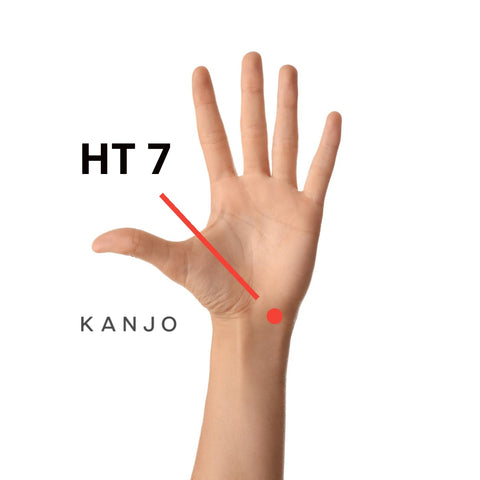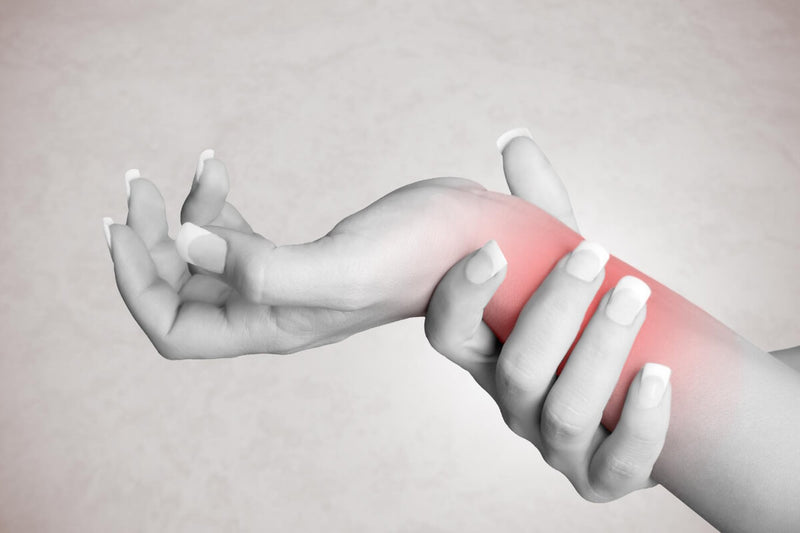How often do you experience hand cramps? With everyone on their smartphones, tablets, and laptops, we all use our hands for a variety of tasks throughout the day. This constant activity can lead to repetitive stress injuries like hand cramps.
If you suffer from them, then you probably already know that they can be very painful and uncomfortable. They make it difficult to hold objects, open jars, hold a smartphone, type, write, and play musical instruments.
In this article we will explore the causes of hand cramps, how to treat them, and how to prevent them.

Overview
Hand cramps (focal dystonia) are painful muscle spasms that occur in the hands or fingers. They usually happen after prolonged periods of repetitive movements such as typing, writing, playing instruments, or using tools.
They usually occur in the fingers and thumb, but can also spread and affect your wrist, forearm, and other parts of the body.
The hand cramps don't usually last long, and most people get over them after a few minutes. However, if left untreated, they can become more frequent and cause pain for a longer period of time.
What Causes Hand Cramps?
The cause of sudden hand cramps is often unknown, but there could be underlying causes to look into. Some potential causes include:
1. Low Magnesium
Magnesium helps to keep muscles relaxed, so low levels may contribute to cramping. This mineral is found naturally in foods like nuts, beans, whole grains, and leafy greens. It's also available as supplements.
Low levels of magnesium can also lead to:
- Restless leg syndrome (RLS), which causes an irresistible urge to move the legs.
- Headaches
- Fatigue
- Menstrual cramps and PMS
2. Dehydration

Dehydration can weaken the muscles and nerves, making them more susceptible to cramping and injury. If you're not drinking enough water, you'll likely feel tired and have dry skin.
You should drink at least 8 glasses of water each day. Depending on the environment and situation, you may need more water. If the weather is hot or humid, you should drink more than usual. If you're physically active, you should also drink more than normal to replace lost liquids through perspiration.
Drinking alcohol can dehydrate you further, so avoid consuming large quantities of alcoholic beverages as that can lead to muscle and hand cramps.
3. Electrolyte Imbalances
Electrolytes help regulate nerve impulses and muscle activity. When electrolytes are depleted, nerve signals can become distorted and muscles can contract without warning, leading to hand cramps.
An electrolyte imbalance can be caused by various health conditions or situations, including:
- Excessive heat
- Chronic vomiting from pregnancy, bulimia, or other reasons
- Cancer treatments
- Severe dehydration
- Kidney disease
- Excessive heat
It's best to talk with your doctor about what might be causing your electrolyte imbalances and how to treat the underlying conditions.
4. Poor Circulation
When blood flow isn't adequate to the muscles, they can become weak and stiff, resulting in hand cramps, tingling, numbness, and pain.
Poor circulation can be caused by poor nutrition, lack of exercise, high cholesterol, heart problems, diabetes, smoking, and obesity.
5. Overuse Injuries

Overuse injuries, also known as writer's cramp, can result when muscles are repeatedly used beyond their ability to recover. An overuse injury can occur from various activities, including:
- Writing or gripping items excessively for prolonged periods of time.
- Playing musical instruments.
- Typing for a long time.
- Repetitive motions of the same tasks.
6. Carpal Tunnel Syndrome
Carpal tunnel syndrome occurs when pressure builds up inside the wrist due to swelling of the tendons and surrounding tissues. That can lead to compression of the nerves from the palm to the forearm.
Pressure can build up because of repetitive motion, such as typing, paired with poor ergonomics. Symptoms of carpal tunnel syndrome include:
- Numbness, tingling, or burning in your palm and fingers
- Decreased strength and range of movement in your hands
-
Swelling sensation
7. Rheumatoid Arthritis
If you have rheumatoid arthritis (RA), it can cause inflammation of the joints, ligaments, and tendons. This can make your hands swell and stiffen, leading to hand cramping.
RA is an autoimmune disorder that causes joint damage and inflammation. Over time, mobility decreases and stiffness increases.
RA symptoms include:
- Painful, swollen joints
- Joint stiffness
- Tenderness
- Fatigue and weakness
- Weight loss
8. Stiff Hand Syndrome

Stiff hand syndrome is a rare condition that causes painful muscle spasms in the hand and fingers due to a complication of diabetes.
The diabetic stiff hand syndrome can affect people with type 1 and type 2 diabetes. It leads to limited finger movements because the hands have become thick and waxy.
Symptoms include:
- Finger or thumb stiffness
- Weak hand joints
- Thick and waxy skin on the back of your hand
- Inability to bring your fingers together
Controlling and managing blood sugar levels may prevent this condition. Stretching and exercising your hands and fingers regularly can help reduce stiffness and improve flexibility.
9. Kidney Disease
Kidneys play a major role in maintaining proper fluid balance within the body. When kidney function becomes impaired, fluids and electrolytes accumulate and become imbalanced in the body, leading to kidney disease (renal disease).
Kidney disease will lead to swelling, nerve damage, and hand cramps. The most common symptoms of kidney disease include:
- Fatigue
- Difficulty concentrating
- Headaches
- Muscle aches
- Nausea and vomiting
- Insomnia
- Swelling in your ankles, feet, and hands
How to Prevent Hand Cramps

Preventing hand cramps will depend on why you're getting them in the first place. If you already have a medical condition, then you'll need to work with your doctor to find out what might be causing your symptoms.
Even if you're not getting hand cramps, you can still do things to keep your hands healthy and prevent the cramps from occurring. Here are some tips to help you avoid developing hand cramps:
- Warm up before working out. Your muscles should feel warm before exercise begins.
- Stay hydrated. Drink plenty of water throughout the day. Water helps flush toxins from your system, which can help prevent dehydration.
- Stretch before and after exercise. Stretching will help keep your muscles loose and flexible, while strengthening them at the same time.
-
Avoid prolonged, repetitive actions. Avoid using your hands for tasks that require repetitive motions for long periods of time. Take breaks to stretch and relax the muscles.
-
Avoid high amounts of alcohol. Alcoholic beverages can dehydrate you, which can increase hand cramping.
How to Get Rid of Hand Cramps?
There are various home remedies to treat and get rid of hand cramps.
1. Stretching

Stretching is one of the best ways to relieve hand cramps. Stretch your hands, wrists, forearms, shoulders, and neck muscles as they're all connected. This will help loosen tight muscles and give your hands more freedom. You can also try massage therapy to ease muscle tension.
2. Acupressure
Acupressure is another effective way to relieve hand cramps by applying pressure to certain points on your hands. Applying firm pressure on the acupressure points can stimulate circulation and release tension in your hand and related muscles.
Some of the key pressure points:
1. Heart 7 (HT 7)

2. Pericardium 6 (PC 6)

3. Large Intestine 4 (LI 4)

Check out our full, in-depth article on Hand Acupressure Points to learn more about these and the other pressure points on your hands.
3. Rest Your Hand
If you've been doing any kind of strenuous or repetitive activity, it's important to rest your hand. Give your muscles and nerves time to recover from the strain.
When you're resting your hand, make sure you don't use it for anything else. It's better to let your hand recover than risk aggravating injury.
4. Heat and Cold Therapy
Heat and cold therapy can be used to reduce pain and inflammation, helping to treat hand cramps.
Cold packs can reduce inflammation and swelling from acute injuries. Apply ice directly to the affected area for 15-20 minutes a few times throughout the day.
Hot pads can be applied to the skin to reduce pain and inflammation from chronic conditions like arthritis. Heat therapy will help increase blood flow and circulation, helping improve flexibility and muscle relaxation.
5. Hydrate

Drink enough water to stay well-hydrated. Dehydration can lead to headaches, dizziness, fatigue, and muscle tension. Make sure you drink plenty of fluids throughout the day to help relieve hand cramps.
6. Vitamins and Supplements
Vitamins and supplements may help prevent hand cramps and promote recovery. Some common vitamins include B12, magnesium, vitamin C, and potassium.
When to See a Doctor

Hand cramps are usually temporary and harmless. However, if your hand cramps are frequently occurring and interfering with your daily life, see your doctor. A visit to the doctor can help determine whether there's an underlying cause for the symptoms.
Hand cramping is usually a symptom of an underlying condition. Doctors will be able to take your full medical history into consideration and recommend treatment options that could alleviate your hand cramps and conditions.
Seek medical attention if the cramps are accompanied by other symptoms such as:
- Weakness, numbness, tingling, burning sensation, or difficulty moving your fingers.
- Rapidly beating heart.
- Shortness of breath or difficulty breathing.
- Frequent nausea or vomiting.
Hand Cramps FAQs
Can Hand Cramps Be a Sign of Something Serious?
Hand cramps by themselves are not serious and are usually temporary. But they can potentially be a symptom of a more serious, underlying condition if the hand cramps are frequent and severe. They could signal nerve damage, thyroid problems, diabetes, kidney disease, or even Lou Gehrig's disease. If you have persistent hand cramps, talk to your doctor about what might be causing them.
Can Vitamin D Deficiency Cause Cramps?
Vitamin D deficiency has been linked to hand cramps, muscle aches, muscle spasms, fatigue, and bone problems. The best way to get adequate amounts of vitamin D in your diet is through exposure to sunlight. You should also consider taking a supplement if you live in a region where the sun doesn't shine during most of the year.
Do Bananas Help with Muscle Cramps?
Bananas contain potassium which helps maintain fluid balance within cells and muscles. Potassium levels tend to decrease when people become dehydrated. This can contribute to muscle cramps and weakness. Eating bananas can replenish potassium levels and help ease muscle cramps.
Does Salt Help with Cramps?
Salt helps keep your body hydrated. When you're dehydrated, salt helps restore electrolytes to your system. Sports drinks are popular because they contain various salts to help hydrate the body and prevent cramping. Your body uses sodium (a mineral) to regulate its internal temperature. Excessive sweating causes sodium loss from your body, which can lead to dehydration and muscle cramps. Drinking salty liquids like broth, soups, and broths can help replace lost sodium and reduce muscle cramps.
What Happens If You Have a Cramp for Too Long?
If you experience a prolonged bout of muscle cramps, it can affect your ability to move and the quality of your daily life. It can also make it difficult to sleep at night. Persistent, severe cramping should always be seen by your doctor to rule out any potential serious health issues.
Sources:
- https://www.medicalnewstoday.com/articles/319951
- https://www.healthline.com/health/hand-cramps
- https://www.assh.org/handcare/condition/hand-cramps
- https://www.mayoclinic.org/diseases-conditions/muscle-cramp/symptoms-causes/syc-20350820
